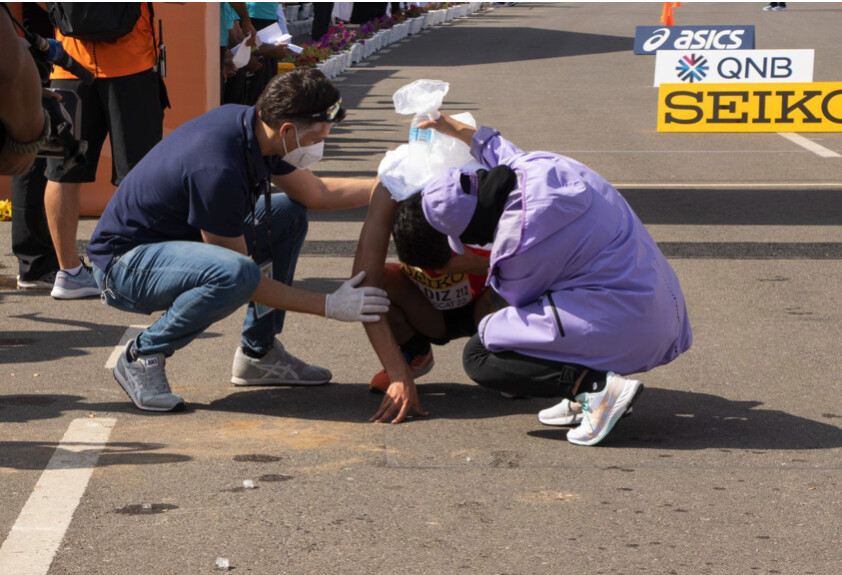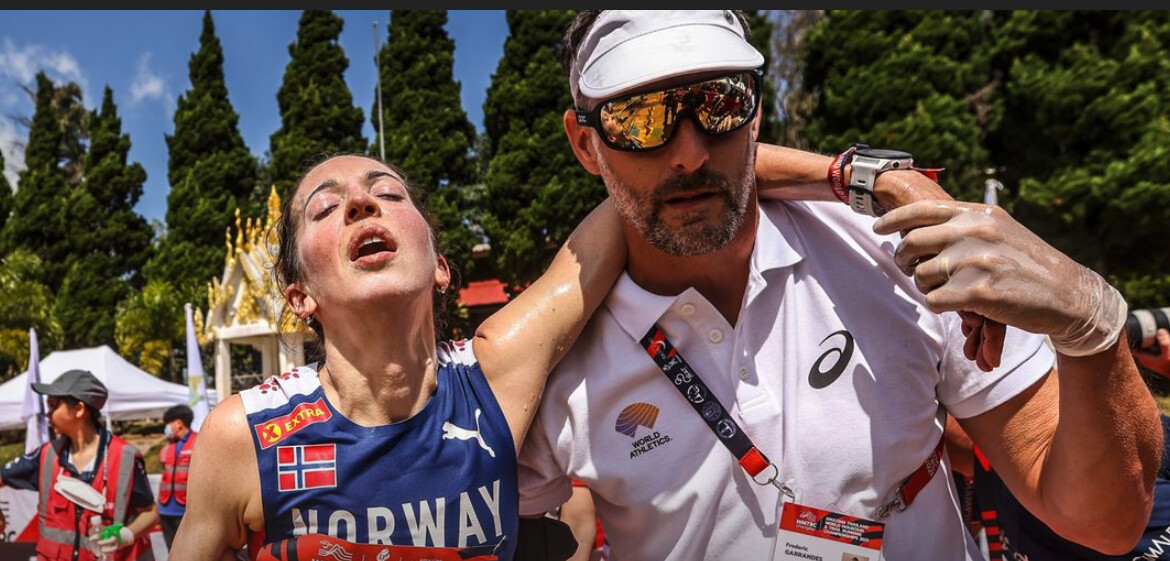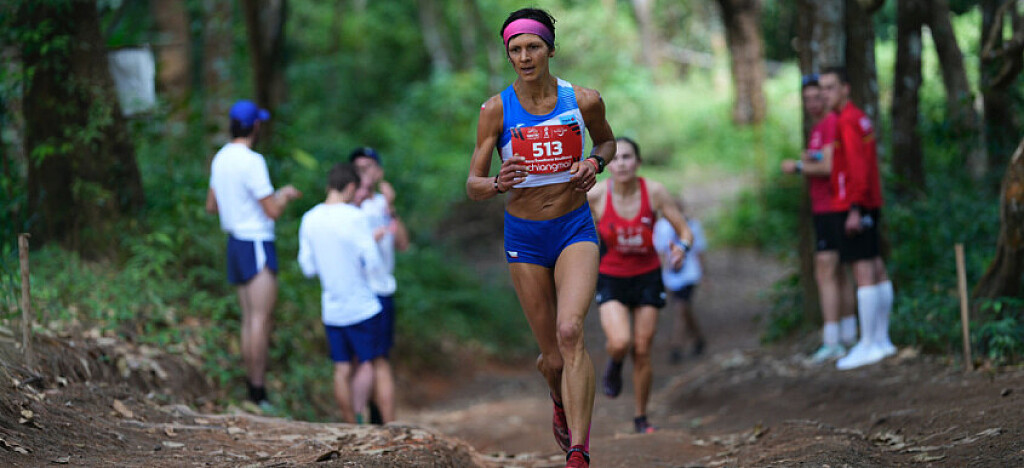Running News Daily
Running News Daily is edited by Bob Anderson. Send your news items to bob@mybestruns.com Advertising opportunities available. Train the Kenyan Way at KATA Kenya and Portugal owned and operated by Bob Anderson. Be sure to catch our movie A Long Run the movie KATA Running Camps and KATA Potato Farms - 31 now open in Kenya! https://kata.ke/
Index to Daily Posts · Sign Up For Updates · Run The World Feed
New study shows athletes how to beat competition heat
The potentially lethal cocktail of high heat and humidity, strenuous exercise and dehydration hit Czech endurance athlete Hana Švestková Stružková so hard during a championship event that her body went into meltdown mid-race and she lost consciousness.
Stružková was racing in the classic up and down 8.2km mountain event at the inaugural World Mountain and Trail Running Championships in Chiang Mai, Thailand last year when, 1.5km from the finish, she succumbed to heat stroke and lost control of her body.


“Every step became harder, I couldn't run straight, my body became weaker and I couldn't control my legs,” Stružková recalled. “I fell down many times. Over the last 200 metres I could only scramble. It felt like a dream. After coming to the finish I was unconscious for one to two minutes and woke up in the medical tent. I couldn’t drink anything for about an hour and a half. I felt I would vomit. I felt very bad.”
Stružková admits she drastically underestimated the severity of the race conditions, she didn’t acclimate properly, and she didn’t drink enough water.
The urgent need to educate endurance athletes about the dangers to their health and performance posed by hot and humid competition conditions and how they can mitigate the risks were among the key findings of a new heat acclimatisation study by World Athletics.
Checking the weather before heading to a foreign climate may be standard practice for travellers, but the study found elite endurance athletes like Stružková were failing to check and prepare for the hot and humid conditions they’d encounter at championship events.
The study also found that while heat preparation information and strategies were available to all athletes and teams, ignorance prevailed and logistical, practical and financial barriers were proving too high.
World Athletics recruited 66 elite athletes – 42 men and 24 women – from 16 countries who competed at the World Athletics Race Walking Team Championships Muscat 22.
The study recorded the athletes’ preparation, knowledge and health, and the effects of competition heat, which can range from dehydration to death.
Race temperatures during the championships in Oman’s port capital of Muscat were 31.3C and higher than historical weather data which predicted average race-start environmental temperatures of 22.5C (morning) and 25.5C (evening).
The three race walk events held over 10km, 20km and 35km resulted in athletes being exposed to these race conditions for between 44 minutes and up to almost four hours, depending on the distance.
The study found a high number of athletes (83%) surveyed were ignorant of heat-related material that could aid their health and performance and 43 per cent did not prepare for the expected hot conditions, blaming the cost and availability of suitable equipment and facilities.
More startling was the lack of knowledge among female competitors in particular, with 42% of women compared with 14% of men surveyed more likely not to know the expected conditions they faced in Muscat for the championships.
Not surprisingly, athletes who implemented heat acclimatisation strategies were more likely to perform better. The study found that athletes who did pre-event heat training were more likely to earn a medal or finish in the top 10. The four surveyed athletes who earn medals did heat preparation and of the 15 surveyed who finished within the top 10, 80% prepared for the heat.
The study, Heat Preparation and Knowledge at the World Athletics Race Walking Team Championships Muscat 2022, was conducted by a 13-member international team led by the World Athletics’ Health and Science Department – whose primary mission is to protect athlete health – in conjunction with the School of Sport, Exercise and Health Sciences at the National Centre for Sport and Exercise Medicine at Loughborough University, UK.
Study lead Frederic Garrandes, World Athletics’ Health & Science Department Scientific Manager, said the reason for athlete, coach and team ignorance and inaction regarding heat acclimatisation was multifaceted. “A certain naivety, underestimation of risk, lack of communication and a lack of professionalism on the part of team managers and athletes,” Garrandes said.
“With global warming, we're increasingly faced with the problem of organising competitions in hot, humid conditions. This poses a health and performance problem for the athletes. The higher the temperature, the greater the number of medical encounters we have in the medical tent.”
The Muscat study builds on work carried out at the World Athletics Championships Doha 2019 by the World Athletics’ Health and Science department to also investigate heat preparation strategies used by endurance athletes.
In Doha, the capital of Qatar, 23% of road race athletes had a medical event, despite events being scheduled to start close to midnight to avoid the heat.
The 2022 Muscat study showed that despite the ready availability of educational resources, including a ‘Beat the Heat’ leaflet developed by World Athletics, a lack of knowledge persists – highlighting the urgent need to increase awareness and action.
Garrandes said publicising the study results far and wide could help bridge the knowledge gap. Making the findings and lessons “accessible in a comprehensible, simplified and multilingual way for lay athletes” was also vital.
There was also a pressing need to educate elite female athletes and athletes from cold/temperate climates in particular about the dangers of competing in high heat.
“Research in this area gives us a better understanding of the incidence of the problem, enables us to treat our athletes more effectively and to build educational programmes to educate our athletes and mitigate the risks,” Garrandes said.
Stružková has this advice for fellow athletes after suffering the debilitating effects of heat stroke while competing in Thailand: “You have to take the opportunity to acclimatise to hot and humid weather before racing in devil conditions.”
by Louise Evans for World Athletics
Login to leave a comment




